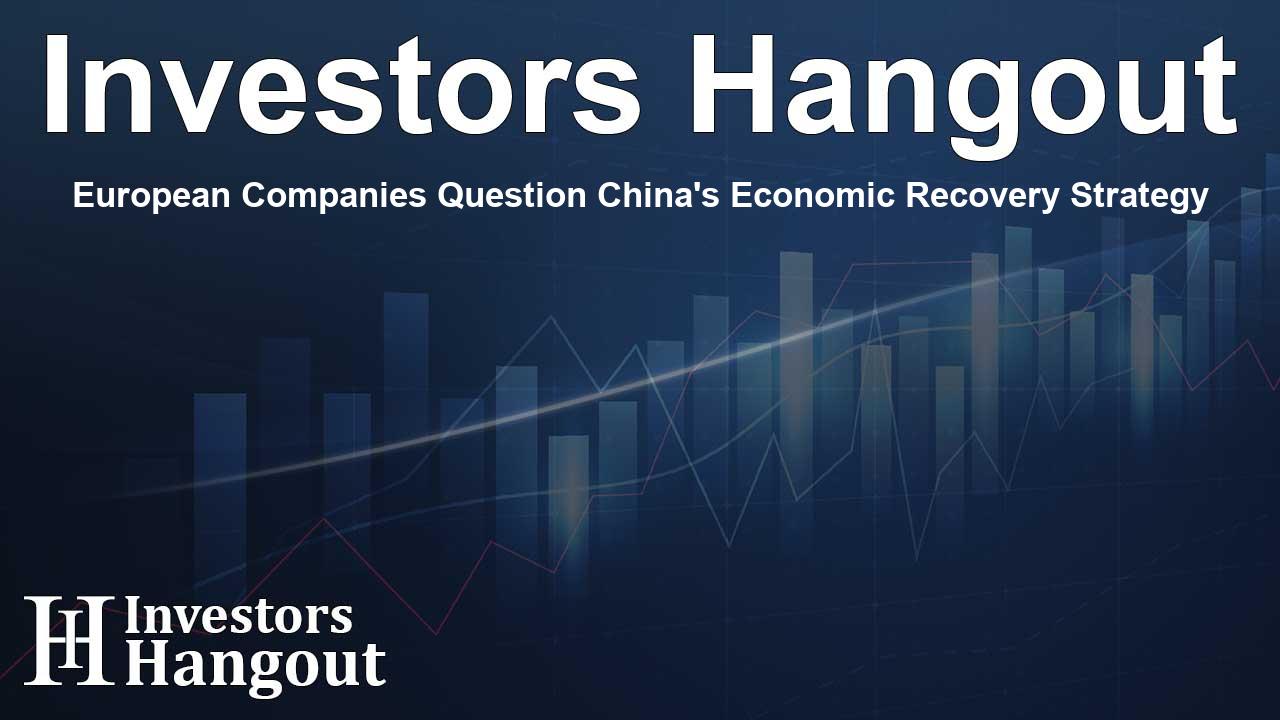European Companies Question China's Economic Recovery Strategy

European Firms Express Concerns Over China's Economic Plans
Recent observations from the European Chamber of Commerce reveal growing unease among European firms regarding China's economic strategy. This apprehension stems from doubts about the effectiveness of government plans to stimulate demand in the nation’s troubled economy. A significant segment of the over 1,700 member companies is increasingly viewing the economic challenges as long-standing issues rather than temporary setbacks.
Shifting Sentiments Among Investors
The Chamber noted a prevailing sentiment of skepticism at corporate headquarters and among shareholders. Their findings suggest that the perceived returns on investments in China have diminished and are no longer in line with the associated risks. Approximately two-thirds of Chamber members report profit margins that have fallen to or below the global average.
Dramatic Decrease in Foreign Investment
Data indicates a steep decline in EU foreign direct investment flows to China, which plummeted by 29% in 2023, totaling 6.4 billion euros ($7.06 billion). The chamber emphasizes that many other global markets present more stable and favorable conditions, making continued investment in China less appealing.
Challenges Ahead for European Firms
European businesses face numerous hurdles in China, including unfair competition due to state subsidies received by local firms, a politically charged business atmosphere, an increasing focus on national security by the government, and continuous market access restrictions. These factors contribute to the growing hesitance regarding investment in the region.
The Central Issue: China's Economic Slowdown
The primary concern for international firms remains the slow pace of China's economic growth. Following a disappointing second quarter, policymakers have shown a willingness to shift away from traditional investment strategies, opting to inject stimulus into consumer sectors instead. However, economists are awaiting detailed plans that go beyond broad pledges to invigorate the $19 trillion economy.
Policy Pledges Without Concrete Steps
While the ruling Communist Party has expressed a commitment to enhancing domestic demand, details on how to effectively boost consumption remain vague. For example, a recent plan outlined by the Party contained no actionable measures. The Chamber criticized these generalized assertions, noting their insufficiency in driving consumer behavior.
Trade-in Schemes and Consumer Spending
The policy documentation suggested a trade-in scheme aimed at promoting consumer goods, but the projected budget allocated for this initiative equates to only about 210 yuan ($29.52) per capita. Such a modest amount raises doubts about its potential to elevate overall domestic spending meaningfully.
Insights from Industry Giants
Prominent members of the European Chamber of Commerce, including major corporations like BASF, Maersk, Siemens, and Volkswagen (ETR: VOWG_p), are grappling with these challenges as they evaluate their future commitments to the Chinese market. With economic stability still uncertain, the outlook for investment remains cautious.
Frequently Asked Questions
What concerns do European firms have regarding China?
European firms are skeptical about China's economic strategies, doubting the effectiveness of government plans to stimulate demand and implement reforms.
How much did EU investment in China decline in 2023?
EU foreign direct investment in China decreased by 29% in 2023, amounting to 6.4 billion euros ($7.06 billion).
What are the main challenges faced by European companies in China?
European companies face unfair competition from Chinese firms, a politicized business environment, regulatory barriers, and a focus on national security.
What is the central concern for businesses operating in China?
The primary issue is China's economic slowdown and the uncertainty around effective government stimulus plans to drive growth.
Which major companies are part of the European Chamber of Commerce in China?
Major companies include BASF, Maersk, Siemens, and Volkswagen (ETR: VOWG_p) among its members.
About Investors Hangout
Investors Hangout is a leading online stock forum for financial discussion and learning, offering a wide range of free tools and resources. It draws in traders of all levels, who exchange market knowledge, investigate trading tactics, and keep an eye on industry developments in real time. Featuring financial articles, stock message boards, quotes, charts, company profiles, and live news updates. Through cooperative learning and a wealth of informational resources, it helps users from novices creating their first portfolios to experts honing their techniques. Join Investors Hangout today: https://investorshangout.com/
Disclaimer: The content of this article is solely for general informational purposes only; it does not represent legal, financial, or investment advice. Investors Hangout does not offer financial advice; the author is not a licensed financial advisor. Consult a qualified advisor before making any financial or investment decisions based on this article. The author's interpretation of publicly available data shapes the opinions presented here; as a result, they should not be taken as advice to purchase, sell, or hold any securities mentioned or any other investments. The author does not guarantee the accuracy, completeness, or timeliness of any material, providing it "as is." Information and market conditions may change; past performance is not indicative of future outcomes. If any of the material offered here is inaccurate, please contact us for corrections.